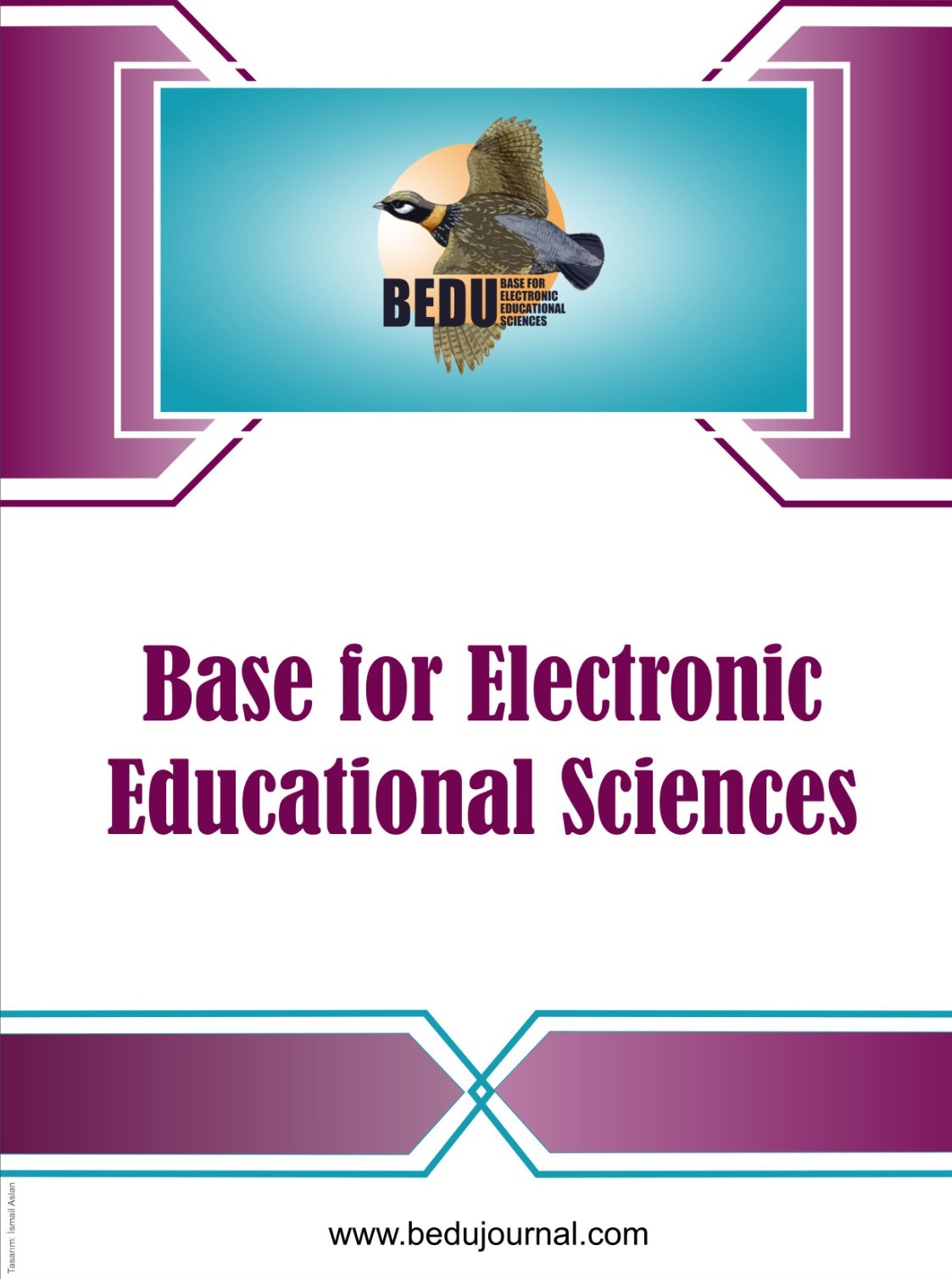Research article | Open Access
Base for Electronic Educational Sciences 2025, Vol. 6(2) 76-93
Turkish Teachers' Opinions on the Turkey Century Maarif Model Turkish Language Teaching Program
pp. 76 - 93
Publish Date: October 03, 2025 | Single/Total View: 108/40 | Single/Total Download: 125/42
Abstract
When looking at the history of education, it is inevitable that education systems undergo change and development universally for all nations due to the dynamics of curriculum development. Similarly, when we examine the history of the Turkish Education System, we see that it has experienced numerous changes. The most recent change was introduced under the name of the 2024 Maarif Century Program. The education system functions as a whole, and naturally, many teaching programs have also undergone change and development. The purpose of this study is to determine Turkish teachers’ opinions about the Turkey Century Maarif Model Turkish Teaching Program. The study employed the basic qualitative research design, one of the qualitative research patterns. The study group consisted of Turkish teachers working in various provinces of Turkey during the 2024-2025 academic year. Data were collected through a semi-structured interview form prepared by the researchers. Seven teachers working within the Ministry of National Education (MEB) participated in the study. To analyze the data obtained from this research, the deductive qualitative data analysis technique was used. According to the results derived from the findings, it was concluded that it is difficult to cover the learning outcomes of the Turkish course within the allotted time. While the learning outcomes related to writing skills were considered ideal for students, those related to listening skills were found to be boring by students. Moreover, the assessment and evaluation approach was reported to be exhausting for teachers, and some skill-based assessment practices were perceived as inefficient by them.
Keywords: Turkish language education, Turkish language teaching curriculum, Turkish language teacher, Turkish language course
APA 7th edition
Carpar, B., Kana, F., & Adiyaman, M. (2025). Turkish Teachers' Opinions on the Turkey Century Maarif Model Turkish Language Teaching Program. Base for Electronic Educational Sciences, 6(2), 76-93.
Harvard
Carpar, B., Kana, F. and Adiyaman, M. (2025). Turkish Teachers' Opinions on the Turkey Century Maarif Model Turkish Language Teaching Program. Base for Electronic Educational Sciences, 6(2), pp. 76-93.
Chicago 16th edition
Carpar, Bilgin, Fatih Kana and Mehmet Adiyaman (2025). "Turkish Teachers' Opinions on the Turkey Century Maarif Model Turkish Language Teaching Program". Base for Electronic Educational Sciences 6 (2):76-93.
Agazu, B. G., Dejenu, A. K., & Debela, K. L. (2022). Exploring the practice and challenges of active learning methodology in some selected Ethiopian public universities. Cogent Education, 9(1), 2089007.
Akpınar, B., Özer, B., Oral, B., & Köksalan, B. (2024). Türkçe öğretmeni adaylarının dijital yeterliklerinin incelenmesi. Afyon Kocatepe Üniversitesi Sosyal Bilimler Dergisi, 26(1), 233-246.
Akyol, H. (2006). Yeni programa uygun Türkçe öğretim yöntemleri. Kök Yayıncılık.
Benzer, A. (2004). Cumhuriyet dönemi eğitim felsefesi. Otopsi Yayınları.
Bobbitt, Q. M. (2018). Sınıfta teknoloji için eğitimci mesleki gelişimi: Bir değerlendirme çalışması (Doktora tezi, Güney Kaliforniya Üniversitesi).
Bolat, Y. (2017). Türkçe öğretmeni adaylarının öğretmen yeterlik algılarının çeşitli değişkenler açısından incelenmesi. Türk Eğitim Bilimleri Dergisi, 15(2), 187-202.
Büyüköztürk, Ş., Kılıç Çakmak, E., Akgün, Ö., & Karadeniz, Ş. (2023). Bilimsel araştırma yöntemleri. Pegem Akademi.
Çelenk, S. (2002). Okul-aile çevre üçgeninde eğitimin işlevi. Çağdaş Eğitim Dergisi, 27(295), 24-28.
Demirel, Ö. (2007). Kuramdan uygulamaya eğitimde program geliştirme. Pegem A Yayıncılık.
Erden, M., & Akman, Y. (1997). Eğitim psikolojisi: Gelişim-öğrenme-öğretim. Arkadaş Yayınevi.
Ertürk, S. (2013). Eğitimde program geliştirme. Edge Akademi.
Erol, T., & Kavruk, H. (2021). Öğretmen adaylarının dijital yeterlilik düzeylerinin çeşitli değişkenler açısından incelenmesi. Milli Eğitim Dergisi, 50(1), 251-278.
Göçer, A. (2018). Öğretmen adaylarının dijital yeterliliklerine ilişkin algıları: Nitel bir araştırma. Turkish Studies - Educational Sciences, 13(19), 505-524.
Göğüş, B. (1983). Türkçe öğretimi ve sorunları. Ankara Üniversitesi Eğitim Fakültesi Yayınları.
Gömleksiz, M. N., Kan, A. Ü., & Özdaş, F. (2005). Öğretmen adaylarının öğretmenlik mesleğine yönelik tutumları. Fırat Üniversitesi Sosyal Bilimler Dergisi, 15(1), 223-236.
Hotaman, D. (2010). İlköğretim programlarının öğretmen yeterlikleri açısından değerlendirilmesi. Yüzüncü Yıl Üniversitesi Eğitim Fakültesi Dergisi, 7(1), 24-41.
Howe, K. R. (2002). A critique of experimentalism. Qualitative Inquiry, 8(2), 206-221.
Karabulut, A., & Tunagür, M. (2021). Dijital vatandaşlık algısının bazı değişkenler açısından incelenmesi: Eğitim fakültesi örneği. Türk Sosyal Bilimler Araştırmaları Dergisi, 6(2), 122-139.
Karagöl, E., & Aydoğan, Ş. (2025). Öğretmen adaylarının dijital okuryazarlık düzeylerinin incelenmesi. Dijital Eğitim Araştırmaları Dergisi, 2(1), 45-60.
Kaya, M., & Aydın, E. (2019). Dijital okuryazarlık ölçeği: Geçerlilik ve güvenirlik çalışması. Trakya Üniversitesi Eğitim Fakültesi Dergisi, 9(2), 410-428.
Kavcar, C., Oğuzkan, F., & Sever, S. (1997). Türkçe öğretimi. Engin Yayınevi.
Kılıç, D. (2000). Eğitimde program geliştirme süreci. Uludağ Üniversitesi Eğitim Fakültesi Dergisi, 13(1), 99-106.
MEB. (2019). Türkçe dersi öğretim programı (1-8. sınıflar).
MEB. (2019). Öğretim programı ve kılavuzlar.
MEB. (2024). İlkokul ve ortaokul Türkçe dersi öğretim programı.
MEB. (2024). Ortaokul Türkçe dersi (5-8. sınıflar) öğretim programı. https://mufredat.meb.gov.tr/
MEB. (2024). Ortak metinler. https://mufredat.meb.gov.tr/
MEB. (2019). Tüm eğitim kademelerine yönelik öğretim programları. https://mufredat.meb.gov.tr/Programlar.aspx
Merriam, S. B., & Tisdell, E. J. (2015). Nitel araştırma: Desen ve uygulama için bir rehber. (Çev. S. Turan). Nobel Yayıncılık.
Öztürk, N. (2007). Eğitim tarihi. Arı Matbaacılık.
Sever, S. (2007). Türkçe öğretimi ve tam öğrenme. Anı Yayıncılık.
Sevim, O., & Bayındır, H. (2016). Ortaöğretim öğrencilerinin dijital okuryazarlık düzeyleri. Eğitim Teknolojisi Kuram ve Uygulama, 6(2), 124-137.
Slattery, P. (2006). Curriculum development in the postmodern era. Taylor & Francis.
Subaşı, S., & Erdoğmuş, N. (2023). Dijital okuryazarlık ölçeği: Geçerlik ve güvenirlik çalışması. Journal of Instructional Technologies & Teacher Education, 12(1), 55-68.
Tyler, R. W. (2014). Eğitim programlarının temel ilkeleri. (Çev. D. Köklü). Pegem Akademi.
White, P. (2010). Eğitimde araştırma yöntemleri. Nobel Yayıncılık.
Yaman, H. (2009). Türkçe öğretmeni adaylarının öğretmenlik mesleğine yönelik tutumları. Gazi Üniversitesi Gazi Eğitim Fakültesi Dergisi, 29(3), 1003-1021.
Yıldırım, A., & Şimşek, H. (2021). Sosyal bilimlerde nitel araştırma yöntemleri. Seçkin Yayıncılık.
Yıldız, C. (2003). Eğitim programları ve öğretim. Lisans Yayıncılık.
Young, P. A. (2009). Instructional design frameworks and intercultural models. IGI Global.
